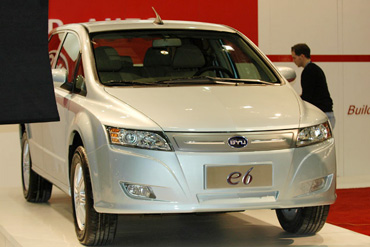
PARIS – For the second time this month, a major European auto maker has linked with a smaller, foreign car maker to develop electric vehicles.
Volkswagen AG and BYD Auto Co. Ltd. of China have agreed to study how they can work together on electric and hybrid vehicles using lithium-ion battery packs.
The move follows Daimler AG’s announcement last week it was purchasing a 10% share of Tesla Motors Inc., the California electric sports car maker.
The VW-BYD accord leaves all the details to future negotiation, but it most likely will lead to Volkswagen using BYD batteries.
“Particularly for the Chinese market, potential partners such as BYD could support us in quickly expanding our activities," says Ulrich Hackenberg, VW board member for technical development.
BYD already has a small fleet of plug-in hybrids on the market in China and is a leader in development of Li-ion batteries using a ferrous phosphate cathode, the technology of choice in China.
However, even with the $230 million investment of Warren Buffett in BYD last fall, the auto maker is short on resources to grow as quickly as it would like. In January, BYD said it would consider licensing its batteries.

Adding the potential volume of supplying Volkswagen would bring economies of scale, and Volkswagen could help BYD improve its control algorithms. Early reviews of BYD’s F3DM plug-in hybrid have said the transitions between gasoline and electric power are rough.
A BYD team led by company Chairman Wang Chuan-fu visited VW’s Elektrotraktion Technology Centre in Isenbuttel, Germany, and a test track in Wolfsburg where they saw a prototype EV and Golf Twindrive hybrid.
Hackenberg led the visitors on the tour, and later VW Chairman Martin Winterkorn signed the memorandum of understanding with Wang. VW says the objective “is to explore the options for partnership in the area of hybrids and electric vehicles powered by lithium batteries.”
China is expected to become a big EV market. The current government restructuring plan includes support for EVs and hybrids.
At a Chinese conference in April, Delphi Corp. Vice President Kevin Quinlan said Buffett invested in BYD because China is building an infrastructure to support EVs and hybrids, range is less important to people there and the market is more accepting. “It’s an opportunity if they can provide sale price and cost.”
At the same conference, BYD’s Henry Li, general manager-overseas trade division, tells attendees, “It is possible that we are going to supply battery and powertrain solutions to selected OEMs.”
Globally, BYD is the second largest manufacturer of Li-ion batteries for cell phones and portable computers.
“In pure electric cars, the systems are much simpler,” Li says. “The key now is the battery. We have some special know-how. We have made many demonstrations, and we have a variety of solutions.”
BYD heavily promotes the safety of its batteries with FePO4 cathodes, labeling them Fe, the symbol for iron.
“Accidents will happen, and in a car with 200-300 kg (441-661 lbs.) of batteries (with cobalt cathodes), that would be a big boom,” Li says. “We are afraid of that (and) why we emphasize safety.”
The FePO4 batteries also are less costly than other technologies, he says, and they have a long cycle life, with the batteries retaining 80% of their charge after 2,000 cycles.
Volkswagen is expected to display an EV prototype at the Frankfurt auto show in September, perhaps the same vehicle it showed to BYD’s Chairman Wang.
In an interview with the magazine Auto Motor und Sport, Hackenberg says the Golf will become more carbon-dioxide friendly in the future, with a 3-cyl. engine, hybridization and an all-electric version for use in Chinese and North American cities.
He also confirms, beginning in 2013, Volkswagen will offer electric powertrains in its new car range called “New Small Family,” based on the concept Volkswagen Up!, first shown at the 2007 Frankfurt auto show.



